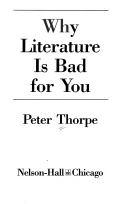The Problem of Too Much Information in Literature
When I am reading Hamlet I often develop an urge to tell people about it, as if the Melancholy Dane's history had heretofore been classified as a top secret. I am bursting with information about Hamlet, so filled am I by the massive "evidence" presented by Shakespeare. So I sit down at my writing table and begin to put together an essay or a lecture in which I seem to extract a thesis out of the evidence in the play. I say "seem" because I think I actually begin with some kind of preconceived idea which rather automatically causes me to arrange the play's evidence to accommodate my thesis. If I am guilty of such a priori thinking, I attribute it to the excessive evidence in the writings of Shakespeare and many other major authors. They give me so much that I can find nearly anything I want. If I wish Hamlet to be an Oedipal figure, I can prove "conclusively" that he is. I shall have equal success if I attempt to prove lat he is a stock Senecan revenge character, a typical example of lenaissance melancholy, an Aristotelian tragic hero, an existentialist, or scholastic, or all of these rolled together. I can't lose; the evidence for il of my theses is overwhelmingly present in the rich and abundant language of the play. Shakespeare has given me a deck of cards, which I can shuffle, cut, and arrange in a nearly infinite number of ways.
Notes:
Folksonomies: literature humanities
Taxonomies:
/art and entertainment/theatre (0.410224)
/art and entertainment/theatre/theatre companies (0.337759)
/technology and computing/hardware/computer components/memory (0.248874)
Keywords:
Aristotelian tragic hero (0.916585 (negative:-0.430345)), nearly infinite number (0.889005 (neutral:0.000000)), stock Senecan revenge (0.880010 (neutral:0.000000)), Melancholy Dane (0.738260 (neutral:0.000000)), excessive evidence (0.707641 (negative:-0.355379)), preconceived idea (0.644834 (positive:0.488028)), priori thinking (0.632314 (negative:-0.528027)), Oedipal figure (0.630351 (negative:-0.580242)), major authors (0.585752 (negative:-0.355379)), equal success (0.579247 (neutral:0.000000)), typical example (0.571662 (neutral:0.000000)), abundant language (0.571573 (positive:0.514441)), Hamlet (0.569927 (negative:-0.057628)), Shakespeare (0.487745 (negative:-0.355379)), play (0.422486 (negative:-0.076375)), thesis (0.384386 (negative:-0.089582)), information (0.360797 (negative:-0.008196)), urge (0.317043 (negative:-0.481379)), arrange (0.302881 (neutral:0.000000)), existentialist (0.295831 (negative:-0.249149)), Problem (0.281611 (negative:-0.481379)), Literature (0.281427 (negative:-0.481379)), people (0.281030 (negative:-0.481379)), history (0.280724 (neutral:0.000000)), secret (0.280013 (neutral:0.000000)), theses (0.277949 (positive:0.514441)), kind (0.274980 (positive:0.488029)), table (0.274044 (negative:-0.577610)), essay (0.273845 (negative:-0.577610)), lecture (0.271687 (negative:-0.577610))
Entities:
Shakespeare:Person (0.865639 (negative:-0.195299)), il:StateOrCounty (0.324200 (positive:0.514441))
Concepts:
Hamlet (0.976729): dbpedia | freebase | opencyc
Tragedy (0.866330): dbpedia | freebase
Tragic hero (0.837165): dbpedia | freebase | yago
Critical thinking (0.724591): dbpedia | freebase | opencyc | yago
Classified information (0.693033): dbpedia | freebase | opencyc | yago
Writing (0.684916): dbpedia | freebase | opencyc
William Shakespeare (0.628548): dbpedia | freebase | opencyc | yago | musicBrainz
Greek loanwords (0.566006): dbpedia





